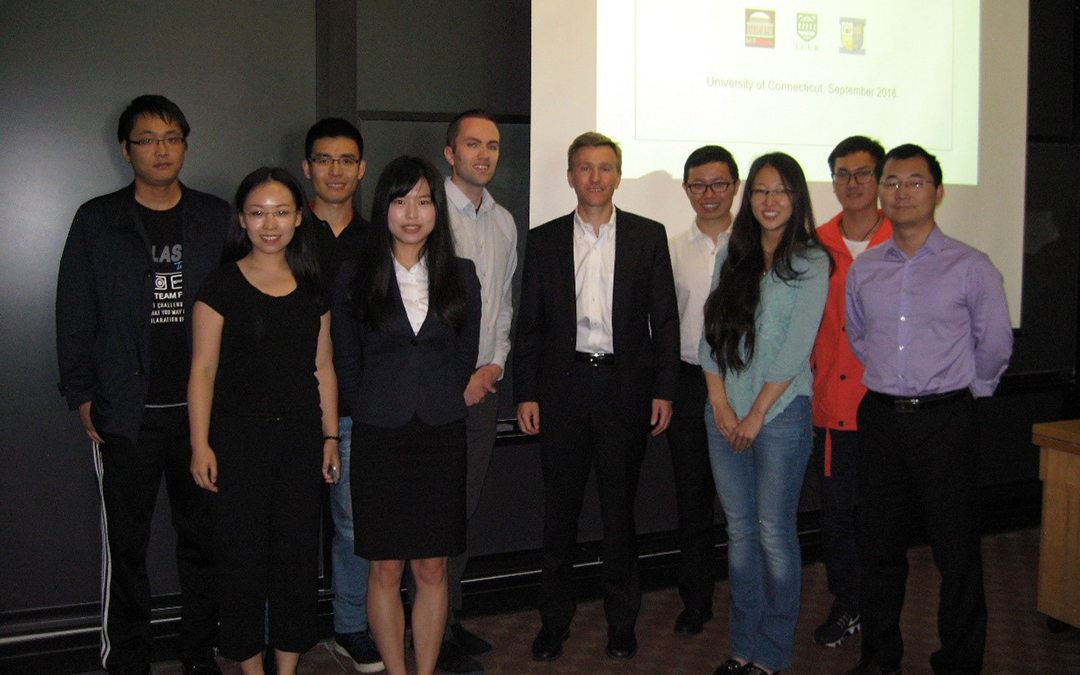Hartford Courant– A downtown Hartford workspace for start-up ventures is open for business, drawing the first entrepreneurs with ideas for phone apps, texting services and other enterprises.
News
All School of Business pressroom news
Upcoming Workshops for the Fall Semester
Our third workshop of the semester is an introduction to data analysis with the Splunk platform next Friday, November 11th. Please visit the OPIM site for a full list of workshops and their dates. All workshops are capped at 20 people so please make sure to register on the site ahead of time. Over the course of the fall semester we plan to have the following:
- Virtual Reality Demo – (New) overview of the different levels of VR and hands-on experience (Completed)
- Intro to 3D Printing – repeat of last semester, was very popular so we are offering it again (Completed)
- Splunk Analytics – (New), introduction to the network analytics software Splunk (Register Now)
- Internet Of Things – (New), real time data analytics using smart devices (Register Now)
Internship Success Story: Melissa Birnbaum
Melissa Birnbaum, a junior Marketing major, was an Audience Marketing Intern at Penske Media Corporation this past summer. PMC is a digital media, publishing and information services company that owns publications like Women’s Wear Daily (WWD) and Variety magazine. Melissa had the chance to apply through a referral who introduced her to the company. Continue Reading
Princeton Review Ranks UConn School of Business Among the Best in the Nation
The UConn School of Business is among the top business schools in the country at which to earn an MBA, according to The Princeton Review’s 2017 edition of “The Best 294 Business Schools.” “We recommend UConn as one of the best to earn an MBA,” said Robert Franek, Princeton Review’s senior VP-Publisher. “We chose the 294 schools in this book based on our high regard for their academics and our assessment of institutional data we collect from the schools. We also solicited and greatly respect the opinions of 25,000 students attending these schools who reported on their experiences.”
The publication identified UConn as a great place to develop real-world credentials, noted its high regard in the areas of finance and risk analytics, and praised its smaller class sizes, which make it easy to build relationships with both professors and classmates.
“I have had interviews with Covidien, Pitney Bowes, General Electric and Travelers Insurance, and I know UConn has a strong presence when I see that I am competing in the second round interviews with students from Yale and Cornell,” one UConn MBA student wrote in a review.
Mission to Mars
UConn Magazine– Getting to the Red Planet is a lot more than just rocket science. Management Professor John Mathieu ’80 (CLAS) is working with NASA on the human mechanics.
Opening Ph.D. Student Speaker Series

This Fall, I had the pleasure of coordinating the Finance Ph.D. Student Speaker Series. The purpose of the Speaker Series is to enhance the research culture of the School of Business by attracting speakers whose research is particularly relevant to doctoral students. Each year doctoral students of the five academic departments make the decision of whom to invite, decide the professor’s agenda, and otherwise facilitate and coordinate the professor’s visit. Continue Reading
Building a Culture of Corporate Compliance
This event has been cancelled.

Corporate compliance is one of the hot-topic issues in business today, and it will be the the subject of a Nov. 15 Executive Education breakfast program, “Building a Culture of Compliance,” offered by the University of Connecticut School of Business at its Stamford Campus. Continue Reading
A Little White Lie – or Worse?

UConn Researcher Discovers that Retail Execs Downplay, Mislead Outlook in Reports to Stockholders
Many CEOs from major U.S. retailers tend to soften, possibly even distort, their company’s financial standings and offer stakeholders pessimistic predictions about the future, even when their companies are thriving.Continue Reading
What’s Normal?
U.S. Economic Expert Shares Vast Knowledge With Our Graduate Students
Economist Cletus C. Coughlin, senior vice president and policy adviser to the president of the Federal Reserve Bank of St. Louis, was a guest lecturer in the School of Business’ graduate program on Sept. 27.
Coughlin presented his knowledge on “The U.S. Economy: What’s Normal?” in Professor Jeffrey Cohen’s “FNCE 5533 – Real Estate Capital Markets” class at the Graduate Business Learning Center in Hartford.

In his 30 years at the Federal Reserve, Coughlin’s responsibilities have focused on advising senior officials on monetary policy, as well as on academic research on the topics of international trade, urban, regional, and real estate economics. He has been with the Federal Reserve since 1987.
Coughlin and Cohen have been collaborating on research for the past 15 years, having published on a wide range of topics, including property taxation, airport infrastructure issues, housing price impacts of airport noise, and the boom and bust of U.S. housing prices.
Most recently, they co-authored an article with a third researcher on foreclosures, which was published in September 2016 in the Federal Reserve Bank of St. Louis Review. Read their article here.
Alumna Margaret Luciano ’15 Ph.D. Wins Award for Rigor, Creativity
Margaret Luciano ’15 Ph.D. (Management), has added another honor to her long list of recognitions.
In September it was announced that her Ph.D. dissertation won the Society for Industrial and Organizational Psychology’s S. Rains Wallace Award, recognizing the best doctoral dissertation in the field of industrial and organizational psychology. Continue Reading